Posts Tagged ‘Karen State’ (107 found)
As the Conflict in Ethnic Areas Continues the International Community and the Burma Government Must Respect the Rights of Refugees and IDPs
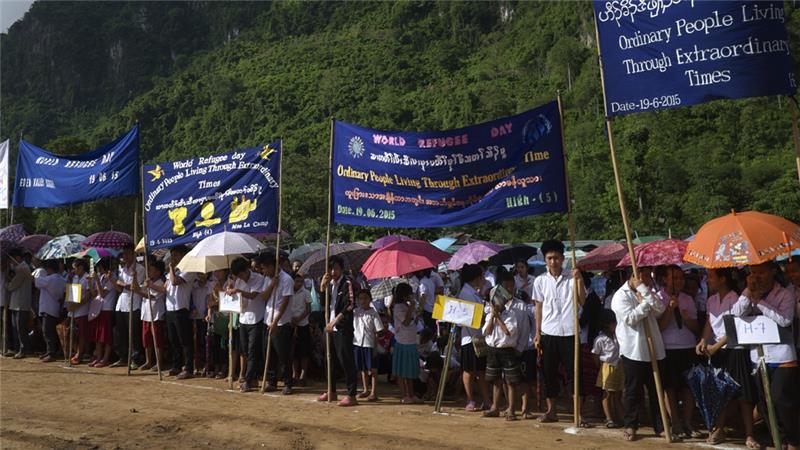 Every year on 20 June, many refugees who have fled Burma due to ongoing conflict, persecution, and human rights abuses, mark World Refugee Day with a sense of uncertainty and anxiety towards their future. This year, as the rainy season begins, refugees along the Thailand-Burma border and Internally Displaced Persons (IDPs) in Kachin, Chin, Arakan and northern Shan States, as well as other conflict-ridden areas, face severe shortages in aid. Over 220,000 IDPs are in camps in northern Burma, while a further 110,000 refugees live in a protracted refugee situation along the Thailand-Burma border. If Burma hopes to make a genuine transition towards democracy it must recognize, respect, and protect the rights of refugees and IDPs […]
Every year on 20 June, many refugees who have fled Burma due to ongoing conflict, persecution, and human rights abuses, mark World Refugee Day with a sense of uncertainty and anxiety towards their future. This year, as the rainy season begins, refugees along the Thailand-Burma border and Internally Displaced Persons (IDPs) in Kachin, Chin, Arakan and northern Shan States, as well as other conflict-ridden areas, face severe shortages in aid. Over 220,000 IDPs are in camps in northern Burma, while a further 110,000 refugees live in a protracted refugee situation along the Thailand-Burma border. If Burma hopes to make a genuine transition towards democracy it must recognize, respect, and protect the rights of refugees and IDPs […]
Another Year Passes in the War Against the Kachin, the International Community Must Pressure the Burma Government
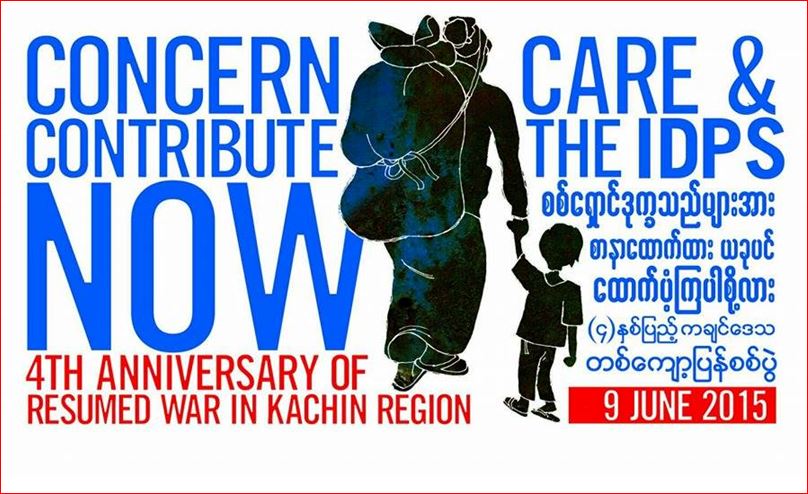 On 9 June 2015, the latest summit of ethnic armed organizations (EAOs) concluded in Law Khee Lar, Karen State. On the very same day four years ago, Burma Army broke its 17-year-old ceasefire agreement with the Kachin Independence Army (KIA), and launched a relentless offensive in Kachin and northern Shan State. As EAOs, including the KIA, were reaffirming their unity, organizations around the world displayed solidarity with those suffering from this four year war, calling for conflict to end, and humanitarian aid to be delivered to over 120,000 displaced by this bloody and ruthless war […]
On 9 June 2015, the latest summit of ethnic armed organizations (EAOs) concluded in Law Khee Lar, Karen State. On the very same day four years ago, Burma Army broke its 17-year-old ceasefire agreement with the Kachin Independence Army (KIA), and launched a relentless offensive in Kachin and northern Shan State. As EAOs, including the KIA, were reaffirming their unity, organizations around the world displayed solidarity with those suffering from this four year war, calling for conflict to end, and humanitarian aid to be delivered to over 120,000 displaced by this bloody and ruthless war […]
Caught in the Crossfire: Chin Civilians Bear Brunt of Conflict in Paletwa, Chin State
[Chiang Mai, Thailand] The Chin Human Rights Organization (CHRO) today condemned both the Arakan Army (AA) and the Burma Army for human rights abuses and violations of international humanitarian law, in the context of recent outbreaks of conflict between the two sides in Paletwa, southern Chin State […]
• • •Ethnic Armed Resistance Organizations Reaffirm Unity at Law Khee Lar
On 2-9 June, the Ethnic Armed Organizations (EAOs) held a Summit hosted by the Karen National Union (KNU) in Law Khee Lar, Karen State to discuss the draft of the Nationwide Ceasefire Agreement, which was finalized on 30 March 2015 by the Nationwide Ceasefire Coordination Team (NCCT) and the Union Peacemaking Work Committee (UPWC).The Summit reviewed the NCA draft, but there are still remaining points to be negotiated […]
• • •Ethnic Armed Organizations’ Summit Statement Law Khee Lar, Karen State, 2-9 June 2015
The Summit of the Ethnic Armed Organizations’ top leaders was held successfully at the KNU Headquarters’ Law Khee Lar Camp in Pa-an District, Karen State, for eight days, from June 2 to 9, 2015. The summit was attended by 108 representatives and observers from 17 Ethnic Armed Organizations, 11 members of the Nationwide Ceasefire Coordination Team (NCCT), 5 members of the NCCT technical assistance team, and specially invited personages, a total of 190 persons including office staff members […]
• • •Companies Land Applications Spark Villagers’ Protest Over Disputed Land in Karen State
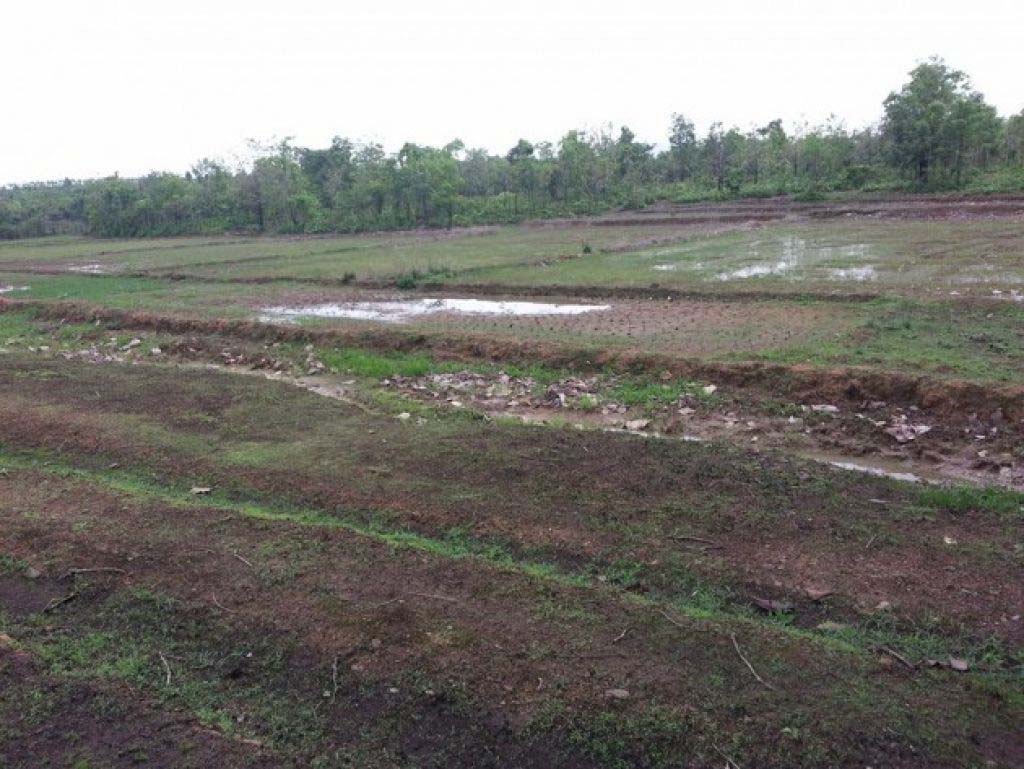 The villagers from Minekan, Hpa-an Township, submitted an letter to the township land registration office on May 27 protesting that applications for permits to grow long-term crops in unclaimed forest land was owned by the local community and was open for investors or companies […]
The villagers from Minekan, Hpa-an Township, submitted an letter to the township land registration office on May 27 protesting that applications for permits to grow long-term crops in unclaimed forest land was owned by the local community and was open for investors or companies […]
Tatmadaw Artillery Fire Directed at Villagers Working on Hill Field Farmes in Hpapun District, February 2015
On February 17th 2015, Burma/Myanmar Tatmadaw troops indiscriminately fired artillery shells towards a location where villagers were clearing vegetation for hill field farming in Saw Muh Plaw village tract, Lu Thaw Township […]
• • •Ethnic Communities: Salween Dams are Fueling War and Must be stopped
Community representatives from Shan, Karenni, Karen and Mon States are handing a petition today to the Myanmar Ministry of Electric Power, and to the Chinese and Thai Embassies in Yangon, urging an immediate halt to dam projects on the Salween River, which are fuelling war and violating the rights of local peoples […]
• • •Impunity for Military Abuses Has to End
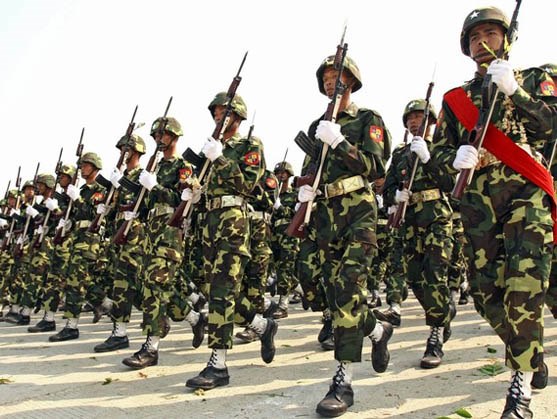 On 7 November, the International Human Rights Clinic (the Clinic) at Harvard Law School published a Legal Memorandum which establishes that certain Burma Army commanders are guilty of crimes against humanity and war crimes under international criminal law. The Legal Memorandum submits its findings on the basis of a three-year investigation (the Investigation) into human rights abuses associated with a Burma Army offensive in Karen State, which was launched in late 2005 and continued into 2008 (the Offensive). The Clinic chose this offensive “because it was one of the largest in recent memory and was widely condemned by the international community.” The Investigation focused specifically on the conduct of two military units – Southern Regional Military Command (SRMC) and Light Infantry Division 66 (LID 66) – in Thandaung Township, Karen State.
On 7 November, the International Human Rights Clinic (the Clinic) at Harvard Law School published a Legal Memorandum which establishes that certain Burma Army commanders are guilty of crimes against humanity and war crimes under international criminal law. The Legal Memorandum submits its findings on the basis of a three-year investigation (the Investigation) into human rights abuses associated with a Burma Army offensive in Karen State, which was launched in late 2005 and continued into 2008 (the Offensive). The Clinic chose this offensive “because it was one of the largest in recent memory and was widely condemned by the international community.” The Investigation focused specifically on the conduct of two military units – Southern Regional Military Command (SRMC) and Light Infantry Division 66 (LID 66) – in Thandaung Township, Karen State.
Articles 7 and 8 of the Rome Statute of the International Criminal Court (ICC) set out the legal requirements for an action to qualify as a “crime against humanity” or a “war crime,” respectively. The essence of a “crime against humanity” is that the act in question should be “part of a widespread and systematic attack directed against any civilian population, with knowledge of the attack.” Similarly, Article 8 stipulates that a “war crime” must be committed “as part of a plan or policy or as part of a large-scale commission of such crimes,” and must constitute a grave breach of the Geneva Conventions 1949, which regulate the conduct of armed conflict […]
• • •Afraid to Go Home: Recent Violent Conflict and Human Rights Abuses in Karen State
The following report was prepared by Karen Rivers Watch (KRW), a coalition of six Karen organizations focused on the environment, women, youth, human rights and development issues. More information about KRW is provided on page 14.
This report is based on field interviews with local villagers and leaders of Karen armed groups, as well as media coverage of the recent conflict. It describes events that led to recent armed conflict between the Democratic Karen Benevolent Army (DKBA) and the combined force of the Burmese Army (BA) and Border Guard Force (BGF) in Karen State. Next, the report gives a detailed account of clashes that occurred along the Salween River in Hpa-an and Hpapun (Mutraw) districts. […]
• • •
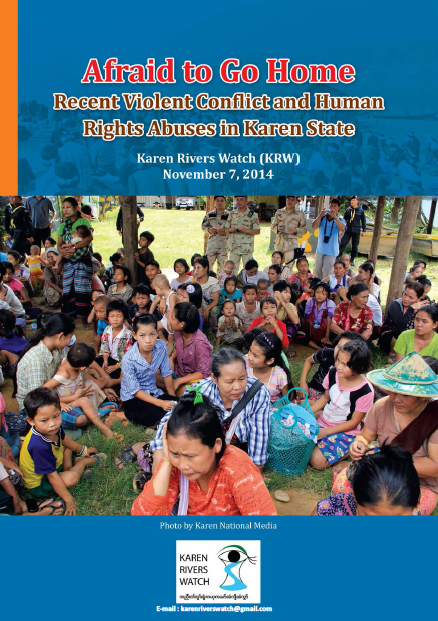








 All posts
All posts